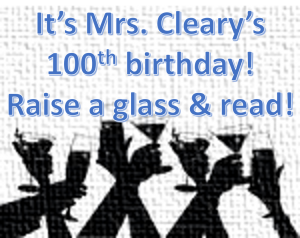Growing Up With the Quimbys
Tedious math problems were put on
Hiatus as we settled down
As our teachers bade us — We,
Nascent adventurers, listening deep, for all of the news from
Klickitat Street.
Yearning to live in Portland’s
Oasis — that sweet little street held childhood in stasis,
Until school tugged us onward, however unjust,
Beguiled, we moved forward, into new worlds thrust.
Essentially, all kids grow at their own pace; we’re
Valiant some days and others
Erase every sign of maturing,
Resist every nudge. Embrace what we hated, and
Loathe what we loved…
Yet, somehow, we did it. We failed and we tried, and
Candid – and callow – took life in our stride. Became
Long-legged teens, with all that implied!
Elusive, those child-spaces bright with sunshine
And limited, privileged childhoods defined, but
Rambunctious Ramona — and her kith and kin — a
Youth filled with innocence gives us again.
I’m not the only one who wanted to live with the Quimbys, I’m sure, but I was probably one of the most quietly rabid. I hid my Uncle Sly’s smokes in the sandbox when I was little; I would have been all over helping Ramona’s dad quit. Sure, Beezus was a pain, but she was the mild version of an older sister; I had two and I can tell you that her little piques and pains were nothing to what I put up with. I loved Henry; I wanted a paper route, an ice-cream eating dog, a mouse called Ralph, motorcycle, and a cat named Socks (and lobbied hard to rename our cat that, but no, my boring family called her TC. Yes. The poor thing’s name was “That Cat.” *throws up hands*). Additionally, I wanted to take ballet, be a bridesmaid and turn fifteen and wear a crinoline. In short, my confused self wanted to live in 1950-something with the Cleary characters, not realizing until I was much older how heinous that would have been for me. Still, there’s a universality and timelessness in Mrs. Cleary’s work which, though almost entirely (? correct me if I’m wrong, here) about privileged white kids, their lives, and the lives of their pets, nonetheless spoke to what diversity she saw and understood at that time. I loved hearing my teacher read these books aloud in grade school, and will keep the work and worlds of Beverly Cleary as a bright spot of childhood memories.

How did these books pass me by as a child?
You are really rocking the acrostic, and I love this poem and this post.
My grandmother had a cat that remained completely nameless. It was the oddest thing to me, but it seemed that Gramma thought that particularly cat was too free-spirited (some would say mean, but Gramma loved her and all her naughtiness and biting) for a name.
Cats just… slink in. And out. And sometimes they just seem too ephemeral for names. But TC was the kind of cat who sat on the top of the fridge and clawed open the bread… a cat like that needs a name so you can SCREECH it. And mutter a lot…
LOVE this post!! Sigh, yes, Mrs. Cleary, a national treasure for sure. I didn’t read the Ramona books until I was older, but still identified with her. I confess to wearing my pajamas under my clothes to school one time and boy was it hot and itchy! Like you, I wanted to live with the Quimbys. After all, they had canned fruit for dessert (I convinced my mother to do the same).
Yes, that world on Klickitat Street was not culturally diverse, but somehow those universal emotions and situations transcended that and we all somehow saw ourselves there.
Stellar acrostic today, Miss T!
Thanks!
I really surprised myself when we visited Portland a couple summers ago; I was with THREE PEOPLE who had never read the Ramona books or any Cleary and they were like, “Klickitat Street? …um, yeah, I know where it is. Why?”
I had fits.
Isn’t it funny that they’re all non-diverse? And yet, the writing makes it not matter. You know how you go back to see if writing holds up over time? I don’t feel like I’d go back and read something racist in Beverly Cleary’s work. That’s… that’s kind of amazing, for a woman who began her writing career in one of the most racially intolerant eras in our country. She’s amazing. Just… amazing.